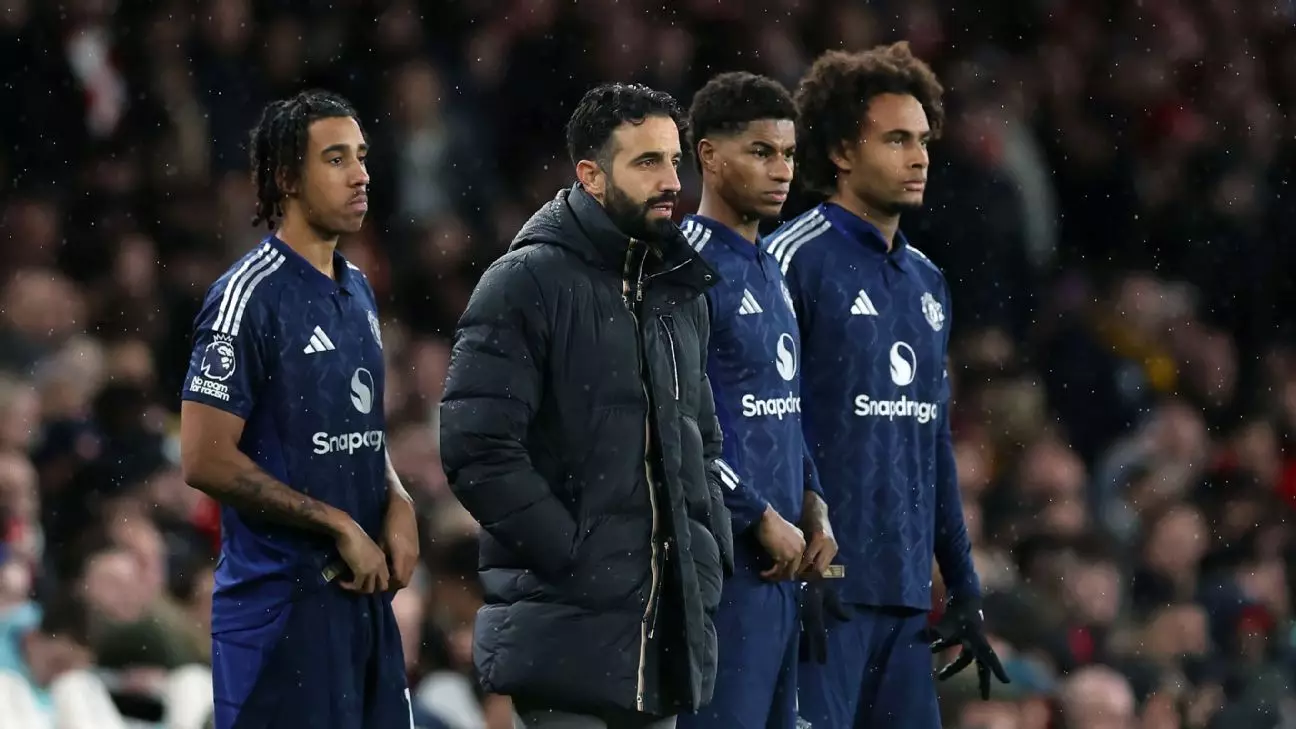Ruben Amorim, the new head coach of Manchester United, is navigating his way through a turbulent landscape filled with high expectations and the significant challenge of managing player fitness. Following a disheartening 2-0 defeat to Arsenal—his first loss in charge—Amorim faces mounting pressure. The defeat not only stings but raises essential questions about his ability to get the best out of the squad, particularly when numerous players are struggling with injuries.
Managing injuries represents a formidable challenge for any football manager, particularly one in a high-stakes environment like Manchester United. Amorim has made it clear that his tactical decisions are deeply influenced by the available fitness of his players. Key figures, including Harry Maguire, Tyrell Malacia, and Mason Mount, spent limited minutes on the pitch against Arsenal, demonstrating how injury concerns dictate selection. The introduction of summer signing Leny Yoro, who is returning from an extended injury hiatus, further illustrates this point.
Amorim’s approach to fitness and match readiness highlights the importance of player health in delivering results. He articulates, “We have to manage within games…” illustrating an adaptive strategy that balances immediate performance with the long-term fitness of his squad. His sentiment points to a necessity for conscientious management in taking calculated risks with player selections. However, there is a fine line between protecting players and compromising team performance.
Despite the disappointing result, Amorim emphasizes the importance of perspective, voicing his intent to extract positives from the match. “I make the evaluation of the game regardless of the result,” he stated, indicating a focus on performance rather than final scorelines. This philosophy underscores the need for ongoing development, both individually and as a cohesive unit.
However, such optimism must be tempered with realism; while mindset is crucial, one cannot ignore the tangible impact of injuries on the team’s dynamic. Defeats often expose the fragility of a squad, particularly when it is not firing on all cylinders. The visible discomfort from players and the fluctuating momentum during the game serves as a stark reminder of the challenges Amorim faces. It is crucial for a manager to not only identify these challenges but to implement immediate and effective solutions that can restore the team’s confidence and performance.
Focusing on player development and rehabilitation can prove beneficial in the long run. Amorim’s handling of Luke Shaw’s ongoing fitness issues serves as an excellent illustration of patience and careful management within a high-pressure profession. Given Shaw’s importance to the squad, allowing him time to regain full fitness can prevent further setbacks. Amorim’s remarks on controlling training loads and ensuring proper rehabilitation signal a commitment to nurturing talent and keeping the squad competitive.
By fostering an environment where players are encouraged to recuperate fully, Amorim is not only safeguarding their physical health but also emphasizing their long-term contributions to the club. This method of player care can ultimately cultivate a more robust squad as players regain their confidence and fitness levels.
As Ruben Amorim returns to the drawing board following his first defeat at the helm of Manchester United, the challenges remain significant. Successfully managing a team amid the realities of injuries requires not just tactical acumen but also an understanding of human longevity and well-being. His observations on fitness limitations and the need for comprehensive evaluations post-match demonstrate a thoughtful approach to management that is essential in a sport where outcomes can pivot on minute details.
In navigating this complex landscape, Amorim’s patience, analytical thinking, and commitment to player welfare will be pivotal as he attempts to steer Manchester United towards a successful future. The road ahead is fraught with challenges, but under his guidance, there remains hopeful potential for renewed vigor in a squad capable of achieving great things.

Leave a Reply